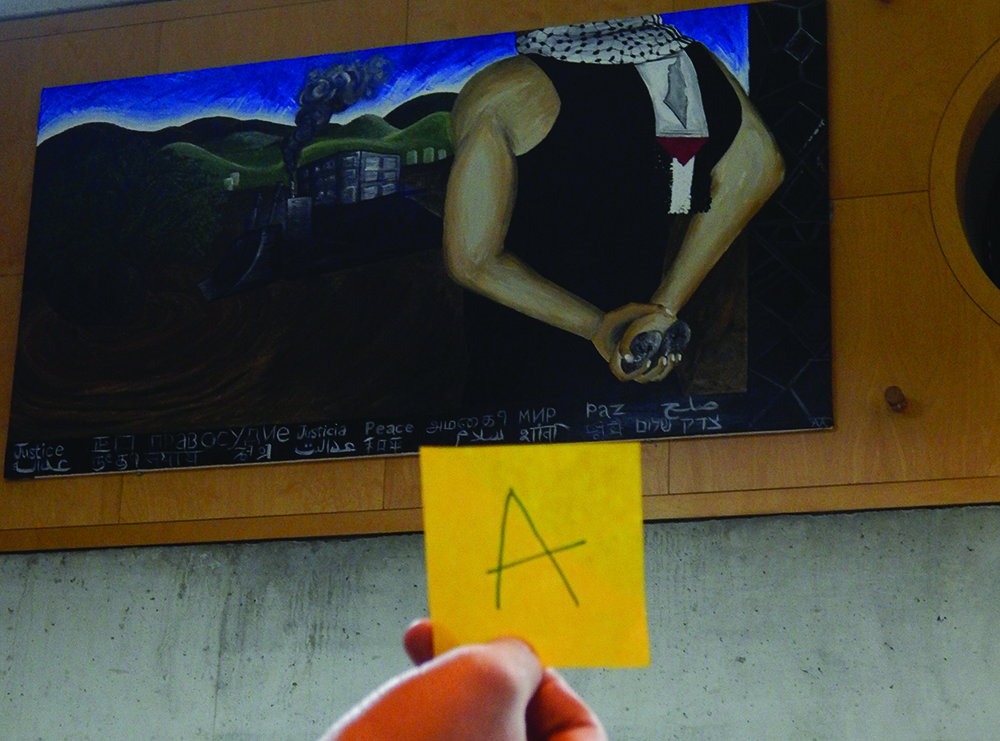Kanchi Uttamchandani | Assistant News Editor
Featured image: Despite backlash from several groups, the YFS has been applauded for its firm stance on freedom of speech regarding the Student Centre’s “Palestinian Roots” mural. | Kanchi Uttamchandani
In a surprising move, the Justice Centre for Constitutional Freedoms, or JCCF, has issued the YFS an ‘A’ grade for freedom of speech practices in its 2016 Campus Freedom Index while giving them an ‘F’ for their policies.
Previously, JCCF’s campus freedom reports had consistently rated the YFS poorly in all criteria.
The ranking for freedom of speech practices involved the Palestinian mural controversy at York. The YFS defended the mural, which had been the subject of demands to have it removed.
The Student Centre, which commissioned the mural in 2012, did not reply in time for publication.
“We understand some students feel offended by the piece, but offence alone is not a reasonable justification to censor artwork, especially on a university campus,” says JCCF Communications Coordinator Michael Kennedy.
Kennedy explains the ‘F’ grade is, in part, due to the YFS’ stance on the Boycott, Divestment and Sanctions movement, an issue the JCCF says is not directly relevant to students.
YFS president Chenthoori Malankov disagrees, saying the student union has the responsibility to advocate in the face of oppression locally, nationally and internationally.
Centre for Israel and Jewish Affairs Vice-President Judy Zelikovitz says: “As someone who staunchly supports freedom of expression, it’s clear to me that healthy debate flourishes in an environment of respectful discourse. This is especially true in shared student space, which is why the YFS has a responsibility to ensure that the Student Centre remains inclusive and safe for all.”
On the other hand, Aidan Fishman of B’Nai Brith Canada, a Jewish human rights organization, says it is misleading to describe the YFS’ decision to display the mural as a victory for free speech.
“The issue here is not whether the artist had a right to create the mural, but rather whether a student union should promote a display which seems to glorify or justify violence against its own Israeli members,” he says.
Zelikovitz highlights that mural guidelines also specified “respect for others” among the criteria for selection, calling on artists to show respect for the audience when dealing with religion and politics.
“An objective person must ask: If one community clearly feels marginalized by an exhibit, how can we say that the exhibit has passed the basic test of showing ‘respect for others’?” asks Zelikovitz.
She further asserts that the artwork glorifies violence, shutting down the opportunity for respectful discourse.
Malankov says the YFS takes positions in line with challenging the injustices various communities among York’s student body face. She emphasizes that the YFS takes positions based on the mandate of students through the elected representatives of the Executive Committee and the Board of Directors.
Political science professor David McNally commends the YFS for having stood firm on behalf of freedom of expression, particularly when it concerns a controversial pro-Palestine artwork. “In defending freedom of political expression, the YFS resisted considerable pressure from inside and outside the university. For this, they deserve our thanks,” he says.
John Greyson, film professor and member of York President’s Advisory Committee on Inclusion, says that York students have vigorous and celebrated traditions of both social justice and free speech, and their defence of this painting in the Student Centre was typically strong.




